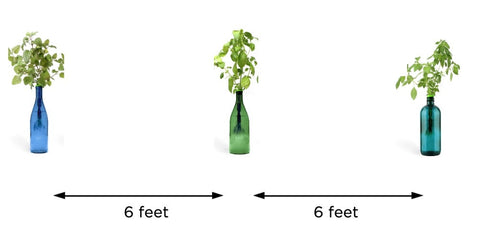The global pandemic has turned our world upside down, affecting our economy, mental health, daily lives, and even the environment. While the coronavirus is undoubtedly not something to celebrate, there’s a curious and possibly positive side effect to this worldwide social distancing.
The rapid spread of the virus has closed schools, restricted travel, emptied grocery store shelves, and affected millions of people worldwide. The measures taken by governments, schools, and businesses to keep people home are crucial for saving lives. But could this social isolation also help reduce greenhouse gas emissions, offering an unexpected benefit for climate change?
It certainly seems that way. But the question remains: will these changes last?
Let’s explore how social distancing has impacted climate change and consider some positive habits we can adopt to continue these benefits.
Here are a few ways we’ve seen a change in greenhouse gas emissions due to the coronavirus:
Reductions in Transportation
With lockdowns in place, people are driving and flying less, which has a significant impact on climate pollution. To put this in perspective: “one round-trip flight from New York to London produces as much greenhouse gas emissions as the preventive climate impact of nearly eight years of recycling,” says Dr. Kimberly Nicholas from the Lund University Center for Sustainability Studies. However, this drop in emissions depends on your location and your commuting habits.

This reduction in travel has made a significant impact in China, the world’s largest contributor to climate change. According to this article from the NY Times, the severe reduction in air travel and industrial activity has led to a noticeable drop in greenhouse gas emissions. With reduced industrial production, manufacturing, and automobile use, there has been a significant decrease in CO2 emissions, air pollution, and nitrogen pollutants.
Changes in Food Habits
The debate about the carbon footprint of eating out versus eating at home is still ongoing. We waste about 25% of the food we buy, but staying home could save fuel that would otherwise be used to drive to bars and restaurants. One clear takeaway is that eating more plant-based foods over animal products is a major way to lower your carbon footprint. Now is a great time to start gardening, using what you have on hand, like the rice and beans you stocked up on early in the pandemic!

Shopping Patterns
There have been two significant changes in shopping behavior since the pandemic began: 1) people are buying much less 'stuff,' and 2) more purchases are being made online. The debate over the environmental impact of online vs. brick-and-mortar shopping continues, with factors like trip-chaining, return rates, and express shipping playing a role. However, it’s clear that many of us are consuming less, which is beneficial for the planet. Reducing consumption helps lower our environmental footprint, especially if we focus on essential items like food. For a cleaner footprint, consider consuming locally by signing up for a local CSA (Community Supported Agriculture) and enjoying fresh, locally sourced fruits and vegetables. Here are some more tips on reducing your food footprint.
Positive Behavioral Changes
While this pandemic has been challenging globally, the indirect benefits of social distancing on climate change and overall health are worth noting. Many people are now spending more time gardening and cooking at home, leading to healthier and more sustainable food choices. CSA subscriptions have increased significantly, supporting local economies and reducing carbon emissions. When we control our food sources, we can avoid unnecessary ingredients like added sugars and fats, promoting public health. Read more about the rise of home gardening during the pandemic.

Will these changes last? Charles Duhigg, author of “The Power of Habit,” suggests that habits formed over a lifetime are hard to break. However, new behaviors can become habits if there is a powerful reward—like the opportunity to combat climate change. Let's use this time to practice mindfulness, connect with our food, and appreciate the world around us. Together, we can make lasting changes for a healthier planet.








There are no comments for this article. Be the first one to leave a message!